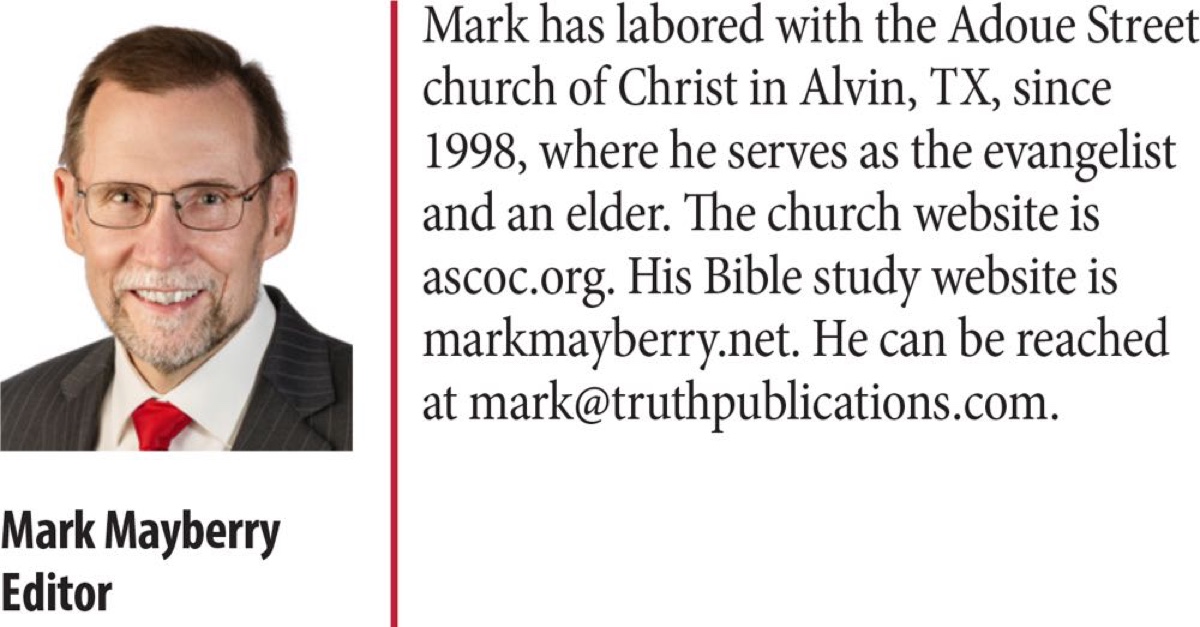By Mark Mayberry
Synopsis: We eagerly anticipate the 2022 Truth Lectures, entitled, “I Believe in Jesus,” (An Apologetic Defense for Faith), which will be held July 11-14 at Athens Bible School in Athens, AL. The theme section of this special issue focuses on the corollary topic of “Outreach.”
What is a witness? In English, a “witness” refers to (1) “a person who sees an event, typically a crime or accident, take place,” or (2) “evidence, proof” (Oxford’s English Dictionary). In a court of law, an eyewitness offers testimony that serves as evidence. Assuming the testimony is credible, it helps prove the innocence or guilt of one who is on trial.
The Greek word martus, translated “witness” (12x) or “witnesses” (23x), carries a similar meaning. It refers to “(1) one who testifies in legal matters; (2) one who affirms or attests (a) of God (or the exalted Christ) as witness; (b) of humans: witnessing by eye and ear; (c) of witnesses who bear a divine message; (3) one who witnesses at cost of life, martyr, in the usage of the persecuted church” (BDAG, 619-620).
What evidence do we have for God’s existence and the authenticity of His word? What testimony does He offer of His existence, goodness, and grace?
When a financial institution considers a credit card or loan application, it looks at the past performance of the applicant. Is he trustworthy? Does he fulfill his commitments? Does he pay his bills, or does the repo man regularly come calling?
We learn to trust God in the same way that we come to trust others, or others come to trust us. What is His track record? Does He have the character/integrity that engenders trust? Does He keep His word? Does He have the resources to carry out His commitments? The answer is a resounding, “Yes!”
In preaching to the pagans at Lystra, Paul urged them to turn from idolatry to serve the living God who made heaven and earth. While permitting the nations to go their own way, He did not leave Himself without witness. Rather, God did good—providing rain and fruitful seasons, satisfying our hearts with food and gladness (Acts 14:8-18).
Paul presented a similar message to the Greek philosophers while standing on the Areopagus in Athens, emphasizing God’s power, provision, and purpose (Acts 17:22-31).
The opening chapter of Romans offers a similar summary: The physical creation reveals God’s eternal attributes: namely, His eternal power and divine nature. However, pride, perversity and perversion blind men and women to such self-evident truths (Rom. 1:18-25).
Careful obedience to God’s revealed word is the key to a happy and productive life (Deut. 32:44-47). The benefits of faith become clear through practice: “O taste and see that the LORD is good; how blessed is the man who takes refuge in Him!” (Ps. 34:8-18). The word of God cuts through all forms of pretense and posturing, revealing our need, challenging us to act with purpose. To help us achieve the land of promised rest, God has provided a perfect High Priest who graciously guides us toward the goal (Heb. 4:1-16, esp. vv. 12-13).
What evidence do we have that Jesus is the Christ, the Son of the Living God? Is there reason to believe in His deity and resurrection?
Peter’s sermon on Pentecost serves as a summation of the gospel’s life-saving message: (1) the evidence of miracles; (2) the evidence of prophecy; and (3) the evidence of credible eyewitness testimony.
When the apostles were baptized in the Holy Spirit, three miracles occurred, offering audible, visible, and intellectual confirmation that God’s hand was involved in the unfolding events. Those who were present heard the noise of a violent rushing wind. They saw tongues of fire upon each of the apostles, who began speaking in a multitude of languages known to those pilgrims who had come from foreign lands. In like manner, Peter also declared that “Jesus the Nazarene (was) a man attested to you by God with miracles and wonders and signs which God performed through Him in your midst, just as you yourselves know” (v. 22).
The evidence of prophecy came from Joel, who foreshadowed the outpouring of the Holy Spirit (vv. 14-21), and David, who spoke of Christ’s resurrection (vv. 22-31) and subsequent ascension (vv. 34-35).
The evidence of eye-witnesses came from Peter and the other apostles: “This Jesus God raised up again, to which we are all witnesses. Therefore, having been exalted to the right hand of God, and having received from the Father the promise of the Holy Spirit, He has poured forth this which you both see and hear” (vv. 32-33).
Near the end of his life, Peter reemphasized the reliability of the gospel message, saying, “For we did not follow cleverly devised tales when we made known to you the power and coming of our Lord Jesus Christ, but we were eyewitnesses of His majesty—citing the miracles that occurred on the mount of transfiguration, and stressing the powerful witness of the prophetic word (2 Pet. 1:16-21).
In the Old Testament, God pleaded with Israel, saying, “Come now, and let us reason together. . .” (Isa. 1:18-20). Arguing against the validity of idols, the Lord said, “Present your case. Bring forward your strong arguments. . .” (Isa. 41:21-29).
In the New Testament, Paul’s pattern for evangelism involved reasoning in the synagogue and the marketplace, trying to persuade Jews and Greeks that Jesus was the Christ (Acts 17:16-17; 18:1-4, 18-19; 19:8-10). The Greek word dialegomai, translated “reasoning” in the aforementioned verses, means “to discuss, address, preach” (Thomas, 1256). Arndt defines it as (1) to engage in speech interchange; (2) to instruct about something” (BDAG, 232). While it can refer to an argument or dispute (Mark 9:34; Acts 24:12; Jude 9; etc.), it also means to “make a speech” or engage in a discussion or “reasonable discourse” (Acts 17:2, 17; 18:4, 19; 19:8, 9; 20:7, 9; 24:25; Heb. 12:5; etc.) (Swanson, 1363).
The apostle Paul did not harangue his audience. He did not rant or rave. He did not employ invectives or insults. Rather, he sought to convince and convert his hearers. Standing before King Agrippa, he said, “I would wish to God, that whether in a short or long time, not only you but also all who hear me this day, might become such as I am, except for these chains” (Acts 26:24-29, esp. v. 29). Writing to the Romans, Paul said, “I could wish that I myself were accursed, separated from Christ for the sake of my brethren, my kinsmen according to the flesh. . . My heart’s desire and my prayer to God for them is for their salvation” (Rom. 9:1-5; 10:1).
Old Testament prophets were commanded to speak, and not be afraid or ashamed. Moreover, they were directly and divinely empowered (Jer. 26:1-6, 7-11, 12-16). New Testament apostles were commanded to be ready to speak, and not be afraid or ashamed. They also were directly and divinely empowered (Matt. 10:16-20; Luke 21:12-15; cf. Acts 4:5-12).
Unlike the prophets and apostles, we do not enjoy the gift of inspired utterance (1 Cor. 13:8-13). Instead, we are empowered through knowing and obeying the perfect law of liberty (Jas. 1:19-25). Absent the gift of personal guidance, how do we fulfill the divine command, “Let your speech always be with grace, as though seasoned with salt, so that you will know how you should respond to each person” (Col. 4:6)? By serious study and personal preparation.
Paul commanded Timothy, “Be diligent to present yourself approved to God as a workman who does not need to be ashamed, accurately handling the word of truth” (2 Tim. 2:14-26, esp. v. 15). The Greek word orthotomeō, rendered “rightly dividing” (KJV), or “accurately handling” (NASB) literally means “to cut straight” (Thomas, 3718). Arndt says it is “found elsewhere independently of the NT only in Proverbs 3:6; 11:5, where it is used with hodos (road) and plainly means ‘cut a path in a straight direction’ or ‘cut a road across country (that is forested or otherwise difficult to pass through) in a straight direction’, so that the traveler may go directly to his destination” (BDAG, 722).
In a similar manner, Peter admonished believers to “sanctify Christ as Lord in your hearts, always being ready to make a defense to everyone who asks you to give an account for the hope that is in you, yet with gentleness and reverence” (1 Pet. 3:13-16, esp. v. 15). The Greek word apologia, rendered “make a defense” (NASB) or “give an answer” (NIV84), refers to “a speech in defense” of someone or something (Thomas, 627). Occurring eight times in the NT, it is used of Paul’s defense of the gospel (Acts 22:1; 25:16; 1 Cor. 9:3; Phil. 1:7, 16; 2 Tim 4:16), and the Corinthians’ vindication of themselves by repentance (2 Cor. 7:11). Arndt says it is used as a legal term and refers to “(1) a speech of defense” or “(2) the act of making a defense, (a) in court, or (2) generally of eagerness to defend oneself (2 Cor. 7:11), or of defending the gospel (Phil. 1:7, 16) (BDAG, 117). Brannan offers a detailed definition of”defense.” In a legal sense, it refers to “the speech act of attempting to prove some act or belief to be reasonable, necessary, or right— especially occurring in a court of law” (Acts 22:1; Phil. 1:7, 16; 1 Pet. 3:15). In a content sense, it refers to “a statement (either spoken or written) that is made to reply to an accusation— especially in a court of law” (1 Cor. 9:3). It can also refer to a defense hearing, i.e., “formal attendance at a judicial proceeding for a defendant to respond to the charges against him” (2 Tim. 4:16) (Lexham Research Lexicon of the Greek New Testament).
The witness of the world and the witness of the word are combined in Psalm 19. We have reliable reasons for faith. Is our faith growing or failing? Are we becoming stronger or weaker? Are we preparing ourselves to teach others, or do we need to be re-educated in the foundational principles of faith?
We need a strong faith. We need to teach others. To fulfil God’s expectation, we need conviction, courage, clarity of mind, and a charitable disposition (John 8:31-32; 2 Tim. 2:15; 1 Pet. 3:15). If we will do our part (by studying, standing, and speaking), He will do His part (Isa. 55:10-11). If we stand with God, He will stand with us (Phil. 2:12-13).
Arndt, William, et al. A Greek-English Lexicon of the New Testament and Other Early Christian Literature. Chicago: University of Chicago Press, 2000).
Brannan, Rick, ed. Lexham Research Lexicon of the Greek New Testament. Lexham Research Lexicons. Bellingham, WA: Lexham Press, 2020.
Swanson, James Dictionary of Biblical Languages with Semantic Domains: Greek New Testament. Oak Harbor: Logos Research Systems, Inc., 1997.
Thomas, Robert L. New American Standard Hebrew-Aramaic and Greek Dictionaries: Updated Edition. Anaheim: Foundation Publications, Inc., 1998.


